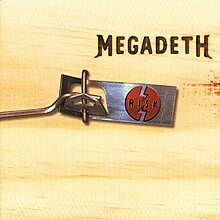Risk (Megadeth album)
| Risk | ||||
|---|---|---|---|---|
 |
||||
| Studio album by Megadeth | ||||
| Released | August 31, 1999 | |||
| Recorded | January–April 1999 at The Tracking Room in Nashville, Tennessee | |||
| Genre | Hard rock | |||
| Length | 51:34 | |||
| Label | Capitol | |||
| Producer | ||||
| Megadeth chronology | ||||
|
||||
| Singles from Risk | ||||
|
||||
| Alternative cover | ||||

2004 remastered edition
|
||||
| Professional ratings | |
|---|---|
| Review scores | |
| Source | Rating |
| AllMusic | |
| Entertainment Weekly | B− |
| Los Angeles Times | |
| Metal Forces | 6/10 |
| Q | |
| The Rolling Stone Album Guide | |
| Sputnikmusic | 3.5/5 |
Risk is the eighth studio album by American thrash metal band Megadeth, released on August 31, 1999 by Capitol Records, the band's last album to be released by the label. The first Megadeth album since 1990 to feature a lineup change, Risk marks the studio debut of drummer Jimmy DeGrasso with the band, as well as the final appearance of longtime guitarist Marty Friedman, who announced his departure a year later. Meant to be a breakthrough on alternative rock radio, Risk received a mixed response because of the great deviation from the band's traditional sound. The backlash ultimately resulted with the band returning towards a heavier sound with its next album.
Megadeth frontman Dave Mustaine has blamed the record's lack of success on the fact that it was released under the "Megadeth" moniker: "if anybody else's name was on 'Risk', it would have sold". The album debuted at number 16 on the Billboard 200 chart and was certified gold in 1999 by the Recording Industry Association of America (RIAA) for shipping half million copies in the United States. As with the rest of Megadeth's studio records released by Capitol, the album was remixed and remastered in 2004, with several bonus tracks added. This reissue also featured a different cover.
Risk followed the band's 1997 release Cryptic Writings, which according to Nielsen Soundscan, had sold 850,000 copies and won widespread praise from rock radio programmers. Referring to the upcoming record, Rob Gordon, a VP of marketing at Capitol Records, stated that "before the last record, we'd maybe had one track at rock radio, and it would be over. With this record, like the last one, I think we'll have four-plus again."
The title stems from a comment by Dave Mustaine's former Metallica bandmate Lars Ulrich, who suggested to Mustaine that he should take more "risks" with his music. According to Mustaine, he was also encouraged to experiment by Marty Friedman’s desire to indulge in his pop sensibilities. On the other hand, newcomer Jimmy DeGrasso wanted to do a "heavy record", unlike the rest of the band who wanted to try out something different. As bassist David Ellefson recalls, the band's manager Bud Prager had told them that they needed "to do something that will make all of their contemporaries knock themselves on the head and say, 'Why didn't we think of that'?". This decision resulted in mixed reviews for both the band and the album; a good portion did not favor the new sound and image, while others were more receptive to the band's attempts at experimenting with their sound and trying something different.
...
Wikipedia
